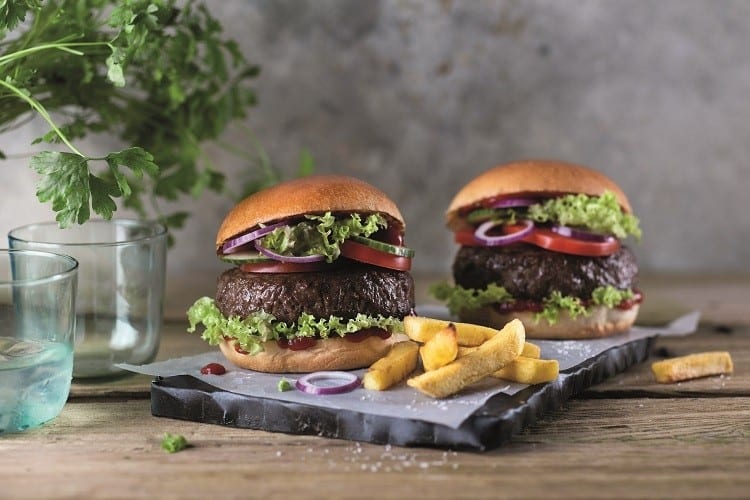When you think of veganism, the first thing that comes to mind is probably not meat. For many people, the words “vegan” and “meat” are two concepts that don’t go together.
But what about vegan meat? Is that an oxymoron?
Many vegans will say yes. They see consuming plant-based meat as a way of compromising their beliefs. Or some folks, like my wife, are grossed out with how eerily similar these plant meats mimic real meat — blood and all.
Others, however, believe that eating vegan meat is perfectly acceptable – and even beneficial – as long as it doesn’t come at the cost of animal lives.
So why do some vegans choose to eat fake meat? That’s what we’re going to explore in this post.
The evolution of vegan meat
Plant-based meat alternatives can be traced back to the early to mid 1900s. In 1943, Dr. John Harvey Kellogg developed his first “meat analog” made from wheat gluten, soy protein, and minerals. While the product was never commercially produced, it laid the groundwork for future fake meat products.
In the 1950s, researchers began using soybean protein to create “vegetarian hot dogs” and “vegetarian bacon.” These products were designed to mimic the taste and texture of real meat without using any animal products.
In the 1980s, companies like Quorn and Gardein entered the market with their own versions of plant-based meat. Since then, the industry has grown exponentially.
Today, plant-based meat is becoming increasingly popular, with the global market value reaching $6.67 billion in 2020, according to Statista. This number is projected to rise gradually over several years to around $16.7 billion in 2026.
Not only are large corporations aggressively creating meat alternatives, but home cooks are also obsessed with turning plants into meat.
Countless viral vegan recipes have emerged on social media platform TikTok, including corn ribs, watermelon steaks and banana peal bacon. Even famous chef Gordon Ramsay has gotten in on the action by creating his own version of a vegan steak.
Clearly, “fake” meats are a popular choice. So why do vegans and vegetarians feel comfortable consuming these alternatives if they represent an industry they’re fundamentally against?
Why do vegans eat fake meat?
Vegans and vegetarians eat fake meat because it’s familiar, convenient, and tastes good. Let’s explore each of these reasons in more detail.
1. Familiarity
Familiarity provides comfort and allows you to keep up with traditional and cultural traditions.
For instance, eating plant-based turkey at Thanksgiving with your family or enjoying a meat pie with your friends reduces the perceived “trade-off” of being vegan as you can find a direct replacement for what you previously consumed (without sacrificing animals).
Listen: The Vegan Trade-Off – Episode 024
Keeping these traditions alive allows for a connection to the past while also maintaining a vegan lifestyle.
It can also be a gateway for others to try veganism as they are more likely to try something familiar to them.
2. Convenience
For many people, convenience is a crucial factor in their food choices. This is especially true for busy families who need fast and easy meals that they can prepare quickly.
Like animal meat products, alternative meats have become increasingly popular as more and more people are looking for convenient vegan options. These products are often pre-cooked and can be easily reheated or used in various recipes.
Additionally, they’re often high in protein and other nutrients, making them a healthy option for those on the go. However, it’s important to note that not all vegan meat products are created equal. Some are unhealthy and processed, so it’s essential to read labels carefully before purchasing.
In general, the healthiest vegan meat products are made with whole, natural ingredients.
Read more: Are You a Junk Food Vegan?
3. Taste
Last but not least, taste is a significant factor in why people eat fake meat. For many people, the flavour and texture of plant-based meats are indistinguishable from their animal-based counterparts. Simply put, these products taste good.
This is thanks to advancements in food technology which have allowed manufacturers to create products that closely mimic the taste and texture of real meat. Just watch how these kids’ brains break as they taste test vegan meats.
Additionally, there are now many different types and flavours of vegan meat available on the market, so everyone can find an option they enjoy.
Commercial issues with fake meat and other vegan products
In 2017, the French government proposed a bill to ban dairy terminology like milk, butter, cream, cheese and yogurt from plant-based alternatives. Then in 2020, meat descriptors like steak, fillet, bacon, sausage and foie gras were banned from vegan meat products (source). The argument here is not to mislead consumers and preserve French heritage.
Here’s an extract from the proposed law:
“We don’t accept those who fight against our heritage, our way of life, deeply imprinted onto our DNA, use the terms “meat”, “steak”, “milk”, or “cheese”. These terms have had a singular meaning for both producers and consumers for thousands of years.”
Preserving culture and heritage is an admirable goal for any nation. However, some believe that this bill was also intended to protect the French livestock industry. In contrast, others think it was a way to prevent vegan products from gaining popularity in France.
We can look to renowned vegan food entrepreneur Miyoko Schinner, known for her famous plant-based dairy company, as an example.
As reported by The Conversation, Miyoko was banned from selling vegan “cheese” made of cashews. The state of California ruled that the term was misleading, so she switched to calling it a cultured nut product – but sales declined.
It’s one thing for consumers to choose alternate meat and dairy products of their own accord and something entirely different for government intervention for the sake of semantics to protect the animal agriculture industry.
Fake meat naming conventions have been around for centuries – so what’s the big deal here?
Any government’s proposal to ban plant-based companies from using terms like “milk” and “sausage” is outrageously short-sighted. It’s an infringement on free speech and also betrays a fundamental lack of understanding of how language works.
Consumers are perfectly capable of understanding that vegan sausage is not made from meat. They already know that.
For example, hotdogs are made from pork, beef, and chicken. No dog flesh is on the ingredient list. Peanut butter doesn’t contain any butter, yet no one seems confused by that.
The only reason for this proposed ban is to protect the interests of the animal agriculture industry, which is increasingly threatened by the growing popularity of plant-based alternatives.
But as history has shown, you can’t stop progress by outlawing words. Plant-based products have been around for decades, and they’re not going anywhere anytime soon.
Why do vegans eat fake meat? Final thoughts
There are many reasons why vegans choose to eat fake meat, and there’s nothing wrong with that. I’m grateful these options exist to reduce animal suffering.
Whether it’s for taste, texture, or convenience, more and more people are turning to plant-based alternatives. And as vegan options become more widely available, even more people will likely make the switch.
Do you think vegans lack integrity if they eat fake meat? What are your thoughts on the proposed bans? Do you think it’s fair? Let me know in the comments below.






It seems like if you are going vegan, and I do on some days and most meals except dinner. I never feel the need to “fake” meat. I can do salads, beans, soups, flat breads, toasts, etc, without “prentending” I am eating meat. If a vegan is that immersed in the arena of “meat” or “animal” free, why fake it? Just eat the balanced veggie diet. Too many unknowns in that fake meat or cheese, etc, to be worth the while.
Personally, if I make the decision to eat according to a regimen, I eat what that regimen includes. If I don’t want eggs for the sake of animal rights, for example, I just don’t eat them. I don’t look for taste substitutes. I explore new flavors. I think it’s important to separate food from pleasure (another form of indoctrination). It is enjoyable to eat. Our body is wired to enjoy eating. Equating it with pleasure, and thus creating a yearning for certain foods we’re turning away from, adds unnecessary complication.
I figure people should eat whatever makes them happy. Soy products do not agree with me at all nor do most legumes. Almond milk takes enormous amounts of water and is ecologically not sustainable. I don’t drink milk anymore. Goat milk seems to be a better choice if I really desire milk. I haven’t found a fake meat that works for me and find that the added cost is more than I can afford.
I think it’s a complex issue, on one hand these products are saving animal suffering – which is very important. On the other hand a lot of plastic waste is created from these products, which in turn can impact animals and is harming our planet. Plus in terms of ingredients, I’ve seen a lot of these options use vegetable oils as the main ingredient, as well as other ingredients that I wouldn’t want to regularly consume (flavour enhancers etc). Depending on their diet, consumers may need to be mindful of whether they are getting enough nutrition from these products – as you say, there are definitely some good products out there, but also some not so good ones. Each to their own I suppose 😀
Excellent points about plastic waste and ingredients. We face the same dilemma with tofu and tempeh and convenience in general. It’s not easy!
I couldn’t have said it better, Amy 👏🏿
I have to admit that once a week or so, I do eat chicken, but I always aim for “humanely raised” and local farmers. I do not eat red meat. I eat a vegan sandwich for a snack or just have a banana with berries. My main choice is pasta, rice, or potatoes with veggies for meals.
Thanks for sharing, Mary. Going with whole food plants is always a solid option.
I do not like burgers , steak , bacon etc , so see no reason to eat ” fake ‘ versions of these.
That totally makes sense. Thanks for sharing!